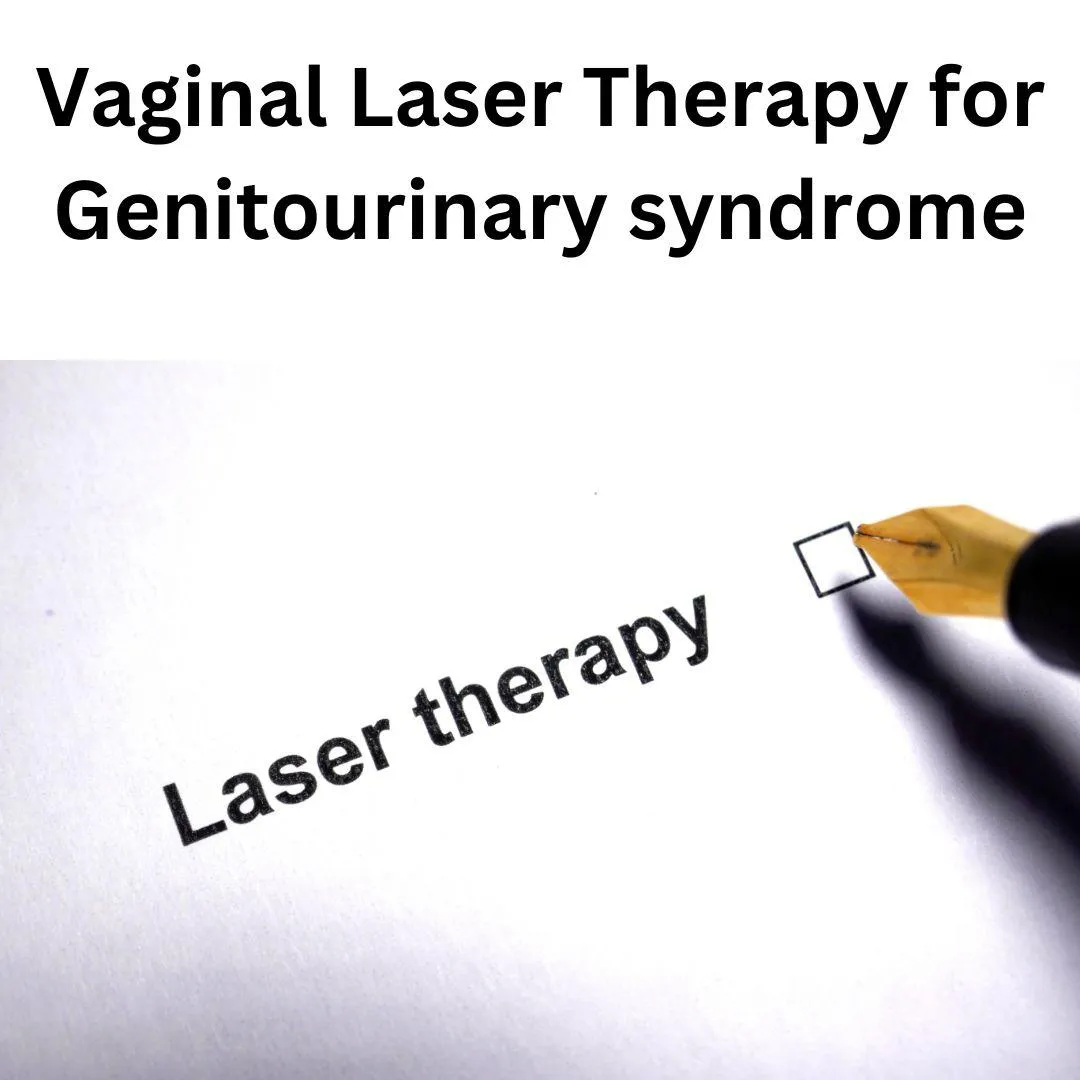*Open to Florida Residents
Blog
Blog

Vaginal Carbon Dioxide Laser Therapy for Genitourinary Syndrome from Menopause
Vaginal Carbon Dioxide Laser Therapy for Genitourinary Syndrome from Menopause
Vaginal health is intricately linked to hormonal balance, particularly estrogen levels. As estrogen declines during menopause, the supportive tissue in the genital and urinary areas undergo changes, resulting in the symptoms associated with genitourinary syndrome.
In contrast to vasomotor symptoms that may alleviate over time, genitourinary syndrome tends to worsen without intervention, significantly affecting a woman’s quality of life. It is estimated that up to 60% of post-menopausal women may experience genitourinary syndrome, yet a substantial number refrain from seeking treatment due to embarrassment or the misconception that these vaginal symptoms are an inevitable part of aging.
You may be wondering what Genitourinary Syndrome is? Genitourinary syndrome of menopause (GSM) is a term used to describe a collection of symptoms affecting the genital and urinary tract areas in postmenopausal women. These symptoms result from the physiological changes that occur due to the decline in estrogen levels during and after menopause. GSM encompasses a range of conditions including:
Vaginal dryness, reduced estrogen levels lead to a decrease in natural lubrication resulting in vaginal dryness. This can make sexual activity uncomfortable or painful.
Vaginal atrophy is the thinning, inflammation, and loss of elasticity of the vaginal walls. This condition can cause discomfort, irritation, and increased vulnerability to infections such as urinary tract infections.
Painful intercourse occurs due to vaginal dryness and atrophy contributing to pain and discomfort during sexual intercourse, a condition known as dyspareunia. This can lead to a decline in sexual desire and satisfaction.
Genitourinary syndrome can affect the urinary tract causing symptoms such as urinary frequency, urgency, and recurrent urinary tract infections. It may also contribute to stress urinary incontinence.
Some women with Genitourinary syndrome experience uncomfortable burning or itching sensation in the genital area, adding to the overall discomfort that post-menopausal women experience.
Due to the chronic nature of this condition, sustained therapy is necessary for symptom regression. Presently, topical vaginal estrogen therapy is widely recognized as the gold standard for treating genitourinary syndrome. However, the use of vaginal estrogen cream therapy has been documented to exhibit low treatment compliance with rates ranging between 15% to 54%. This reduced adherence may be linked to the inconvenience and difficulty of application, particularly for patients with limited dexterity.
In the past decade vaginal laser therapy has emerged as an innovative and effective solution for post-menopausal women experiencing genitourinary syndrome. Vaginal laser therapy helps stimulate collagen production and blood flow to the vaginal tissues, enhancing natural lubrication. This alleviates the discomfort associated with dryness, making sexual activity more comfortable.
Vaginal laser therapy is a medical procedure that utilizes laser technology to stimulate changes in the vaginal epithelial tissue, particularly addressing issues related to GSM. The procedure typically employs a fractional CO2 laser. The laser energy is delivered to the targeted areas of the vaginal mucosa. The laser produces a controlled thermal effect on the epithelial tissue. This controlled heating induces micro-injuries, triggering a natural healing response. The thermal effect stimulates fibroblasts, cells responsible for collagen production. Increased collagen production leads to the restoration and remodeling of the vaginal tissue. Laser therapy enhances blood circulation to the treated area, promoting tissue regeneration. This improved blood flow contributes to the overall health of the epithelial tissues. The process of neo Collagenesis refers to the formation of new collagen fibers, this results in the rejuvenation of the epithelial tissue, improving its elasticity and resilience. As the collagen production increases, the vaginal mucosa becomes more hydrated and supple with enhanced lubrication.
The micro-injuries caused by the laser stimulate the remodeling of the vaginal tissue, which contributes to the normalization of the vaginal epithelial structure.
The procedure is typically well-tolerated with minimal discomfort reported by most patients. Many women can resume regular activities shortly after treatment. The initial treatment consists of 3 laser treatments 3 to 4 months apart for the first year then once yearly afterwards.
Several benefits of Vaginal Laser therapy include restoring elasticity and thickness of the vaginal tissues. This can address issues like vaginal atrophy, which is common in postmenopausal women. The revitalization of vaginal tissue can lead to increased sexual satisfaction. Women often report improved arousal, reduced pain during intercourse, and an overall enhancement in sexual function.
Vaginal laser therapy can also benefit women who experience urinary symptoms associated with Genitourinary syndrome, such as urgency and stress urinary incontinence. Strengthening the vaginal tissues can positively impact urinary function.
Vaginal laser therapy is a non-surgical outpatient procedure that typically takes a short amount of time. The minimal discomfort and quick recovery make it an appealing option for women seeking relief from GSM symptoms. Many women experience long lasting benefits from vaginal laser therapy. This can lead to sustained improvements in symptoms over an extended period.
By addressing the physical symptoms of GSM vaginal laser therapy contributes to an overall improvement in the quality of life for postmenopausal women. This can positively impact emotional well-being and self-esteem.

Vaginal Carbon Dioxide Laser Therapy for Genitourinary Syndrome from Menopause
Vaginal Carbon Dioxide Laser Therapy for Genitourinary Syndrome from Menopause
Vaginal health is intricately linked to hormonal balance, particularly estrogen levels. As estrogen declines during menopause, the supportive tissue in the genital and urinary areas undergo changes, resulting in the symptoms associated with genitourinary syndrome.
In contrast to vasomotor symptoms that may alleviate over time, genitourinary syndrome tends to worsen without intervention, significantly affecting a woman’s quality of life. It is estimated that up to 60% of post-menopausal women may experience genitourinary syndrome, yet a substantial number refrain from seeking treatment due to embarrassment or the misconception that these vaginal symptoms are an inevitable part of aging.
You may be wondering what Genitourinary Syndrome is? Genitourinary syndrome of menopause (GSM) is a term used to describe a collection of symptoms affecting the genital and urinary tract areas in postmenopausal women. These symptoms result from the physiological changes that occur due to the decline in estrogen levels during and after menopause. GSM encompasses a range of conditions including:
Vaginal dryness, reduced estrogen levels lead to a decrease in natural lubrication resulting in vaginal dryness. This can make sexual activity uncomfortable or painful.
Vaginal atrophy is the thinning, inflammation, and loss of elasticity of the vaginal walls. This condition can cause discomfort, irritation, and increased vulnerability to infections such as urinary tract infections.
Painful intercourse occurs due to vaginal dryness and atrophy contributing to pain and discomfort during sexual intercourse, a condition known as dyspareunia. This can lead to a decline in sexual desire and satisfaction.
Genitourinary syndrome can affect the urinary tract causing symptoms such as urinary frequency, urgency, and recurrent urinary tract infections. It may also contribute to stress urinary incontinence.
Some women with Genitourinary syndrome experience uncomfortable burning or itching sensation in the genital area, adding to the overall discomfort that post-menopausal women experience.
Due to the chronic nature of this condition, sustained therapy is necessary for symptom regression. Presently, topical vaginal estrogen therapy is widely recognized as the gold standard for treating genitourinary syndrome. However, the use of vaginal estrogen cream therapy has been documented to exhibit low treatment compliance with rates ranging between 15% to 54%. This reduced adherence may be linked to the inconvenience and difficulty of application, particularly for patients with limited dexterity.
In the past decade vaginal laser therapy has emerged as an innovative and effective solution for post-menopausal women experiencing genitourinary syndrome. Vaginal laser therapy helps stimulate collagen production and blood flow to the vaginal tissues, enhancing natural lubrication. This alleviates the discomfort associated with dryness, making sexual activity more comfortable.
Vaginal laser therapy is a medical procedure that utilizes laser technology to stimulate changes in the vaginal epithelial tissue, particularly addressing issues related to GSM. The procedure typically employs a fractional CO2 laser. The laser energy is delivered to the targeted areas of the vaginal mucosa. The laser produces a controlled thermal effect on the epithelial tissue. This controlled heating induces micro-injuries, triggering a natural healing response. The thermal effect stimulates fibroblasts, cells responsible for collagen production. Increased collagen production leads to the restoration and remodeling of the vaginal tissue. Laser therapy enhances blood circulation to the treated area, promoting tissue regeneration. This improved blood flow contributes to the overall health of the epithelial tissues. The process of neo Collagenesis refers to the formation of new collagen fibers, this results in the rejuvenation of the epithelial tissue, improving its elasticity and resilience. As the collagen production increases, the vaginal mucosa becomes more hydrated and supple with enhanced lubrication.
The micro-injuries caused by the laser stimulate the remodeling of the vaginal tissue, which contributes to the normalization of the vaginal epithelial structure.
The procedure is typically well-tolerated with minimal discomfort reported by most patients. Many women can resume regular activities shortly after treatment. The initial treatment consists of 3 laser treatments 3 to 4 months apart for the first year then once yearly afterwards.
Several benefits of Vaginal Laser therapy include restoring elasticity and thickness of the vaginal tissues. This can address issues like vaginal atrophy, which is common in postmenopausal women. The revitalization of vaginal tissue can lead to increased sexual satisfaction. Women often report improved arousal, reduced pain during intercourse, and an overall enhancement in sexual function.
Vaginal laser therapy can also benefit women who experience urinary symptoms associated with Genitourinary syndrome, such as urgency and stress urinary incontinence. Strengthening the vaginal tissues can positively impact urinary function.
Vaginal laser therapy is a non-surgical outpatient procedure that typically takes a short amount of time. The minimal discomfort and quick recovery make it an appealing option for women seeking relief from GSM symptoms. Many women experience long lasting benefits from vaginal laser therapy. This can lead to sustained improvements in symptoms over an extended period.
By addressing the physical symptoms of GSM vaginal laser therapy contributes to an overall improvement in the quality of life for postmenopausal women. This can positively impact emotional well-being and self-esteem.
Let me help you achieve your goals.
Disclaimer: We understand that every individual's experience is unique and results may vary depending on various factors, such as attitude, adaptability, personal history, and overall health. For your safety and well-being, we highly recommend consulting your physician before beginning any program. At Elite Sexual Hormone Health, we do not diagnose, treat, or prescribe any medical or psychological disorders. We urge you to seek the care of a qualified physician or psychotherapist if you suffer from any psychological or medical disorder. Thank you for choosing Elite Sexual Hormone Health as your partner in your journey towards wellness.
© 2026, Elite Sexual Hormone Health. All rights reserved.
Privacy Policy | Terms of Service | Disclaimer | Accessibility
© 2026, Elite Sexual Hormone Health. All rights reserved.
Website by Hypnotherapy Accelerator





